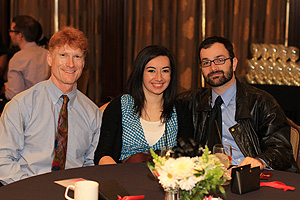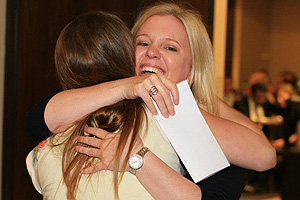Medical Students Meet Their Match

Cooper matched to his top choice - Massachusetts General Hospital.
Fifteen years ago Jason Cooper was a chemical engineer who could not see himself retiring in the profession. His interest in medicine grew out of volunteer work in a Houston-area emergency room and night classes studying biology.
It was then that he decided to make Lubbock his home for a new educational journey, and he began the M.D./Ph.D. program at TTUHSC.
His wife Rebecca, who is also a former chemical engineer, concurrently began her Ph.D. in the Graduate School of Biomedical Sciences, researching the structures of proteins in the membranes of cancer cells that contribute to chemotherapy resistance.
“We had never even heard of Lubbock or Texas Tech,” Cooper said. “An engineer friend of mine spoke highly of Texas Tech and said we should look into continuing our education up in West Texas. We decided to make the move and started our second careers here.”
Cooper was one of 150 medical students who celebrated Match Day, which is an event that plays out on medical school campuses across the country. School of Medicine students participated in Match Day and learned where they will be for the next three to seven years. The results were opened simultaneously at all of the nation’s medical schools.
Making History
Steven L. Berk, M.D., executive vice president, provost and dean of the School of Medicine, said this Match Day was successful and historic for medical students.
“We had many students who matched at schools across the country,” Berk said. “Also, this year is momentous for our Family Medicine Accelerated Track (FMAT) students. These are the first students from this first-of-its kind three-year program to move through to match in their residencies. Schools across the nation have been watching this program to see if it would work, and with this Match Day, these students not only succeeded but committed to staying here in West Texas.”
Charles Willnauer, one of the Lubbock FMAT students, said this match is significant for him and his peers.
“Once I decided on family medicine, I knew the FMAT program was the best option for me,” Willnauer said. “We have all been so busy with rotations, exams and surviving it all that we have not had time to stop and come to the realization that we are at this point.”

Buchanan (left) and Willnauer (right) are two members of the first FMAT class to match to their residencies.
Willnauer completed his M.D./MBA degree in three years. He said one of the highlights of the FMAT program was the second year when the students had one-on-one interactions with a family medicine physician.
“The close interaction with one mentor throughout that year helped me experience the daily work schedule and life of a family physician,” Willnauer said. “It is a privilege to be a part of a program that is filling the need of more primary care physicians and be an advocate on behalf of future family medicine physicians.”
Other FMAT students matching in Lubbock were Keely Bramblett, Clay Buchanan, Eileen Dee and Emily Culver Dosier. Berk said this year 54 percent of students selected primary care, a higher percentage than ever. Of all the specialties, the top two choices were pediatrics and family medicine.
What the Future Holds
With the overall match, 20 percent of the medical students will complete their residencies at TTUHSC and 55 percent will complete their residencies in Texas. Other top schools students matched to were Yale, Stanford, Mayo Clinic Hospital, University of Texas Southwestern Medical Center, and Beth Israel Medical Center in Boston.
Katee Carlisle found out her match early. She is one of many medical students who earn their match through the military. She serves in the U.S. Army and will be completing her urology residency at the Tripler Army Medical Center in Honolulu.
“I joined the army when I finished my undergraduate,” Carlisle said. “I am doing a program the military has through the Health Professions Scholarship Program. I heard about their program once I got into medical school. If you commit to work for the army once you finish school, they pay for your education costs plus a stipend.”
Since Carlisle’s dad, Kyle, served as a medic during the Vietnam War and her grandfather the Navy, she followed in their footsteps.
“I think it inspired me to do the same,” Carlisle said. “My dad really enjoyed his time in Army. He spoke highly about it. It is a good fit for my personality and I get to serve my country.”
As a medical student, Carlisle started out as a second lieutenant reservist. Once she graduates, she will become a captain in the U.S. Army. She got a feel for what the future will be like when she had the opportunity to work at Tripler Army Medical Center in September for a urology rotation.
“I loved it. It’s a little scary to move somewhere that far away, but very similar to our urology program here,” she said. “I felt at home. I fit in with the personalities of the program and it didn’t hurt that it was in Hawaii.”
Years in the Making

With the overall match, 20 percent of the medical students will complete their residencies at TTUHSC and 55 percent will complete their residencies in Texas.
As for Cooper, he matched to his top choice Massachusetts General Hospital, considered Harvard’s best teaching hospital. To get to this day, he spent two years studying for his medical degree, the next three years working for his Ph.D., and his final two years finishing his medical degree. He hopes to specialize in internal medicine with a focus on hematology and oncology.
“A lot of progress has been made treating cancer, but we still have more work to do to find better treatments for patients,” Cooper said. “My ultimate goal is to develop better treatments for patients as a clinician and clinical investigator by testing them in clinical trials.“
During his Ph.D., Cooper’s research focus was in clinical pharmacology. His study, done in the laboratory of Min Kang, Pharm.D., a researcher with the School of Medicine Cancer Center, examined the metabolism of an experimental chemotherapy agent called fenretinide. His metabolism study led to a new drug combination that raises fenretinide levels in the blood of cancer patients. This combination is now being tested in clinical trials for neuroblastoma and ovarian cancer, and is now a new foundation upon which the research team is building as they look for other drug combinations.
“Hopefully the drug combination is already helping patients in trials,” Cooper said. “Through the M.D./Ph.D. program, I have had the best of both worlds with research and my medical degree. I also had the opportunity to work closely with Dr. Everardo Cobos in his clinic and always enjoyed getting the chance to talk to his patients about my research. Even now that I have finished the Ph.D. and have gone back to medical school, I still see his patients at the Southwest Cancer Center from time to time. They always ask how the research and studies are going. On this long road to two degrees they have always cheered me on and have become my surrogate family here in Lubbock.”
Cooper said that his wife’s Ph.D. students and her research focus also being on cancer helped get him through the rigors of his education.
“We helped and supported each other because we both understood what the other was going through,” Cooper said. “We had tough times and could encourage each other.”
As he heads to the next road in his career, he added that TTUHSC’s medical students are on a level playing field with students at any place of residency.
“Our School of Medicine prepared me very well and gave me an excellent foundation for my medical training,” Cooper said. “One of the most important things TTUHSC stressed is providing patient-centered care. Working with Dr. Cobos and others has taught me to be a compassionate listener and to empower patients to make the best decisions for their care.”
Cooper said he is one of the first TTUHSC medical students to interview in internal medicine at his choices for residencies.
“I am hoping to take the TTUHSC name to one of these elite residencies and impress them,” he said. “Hopefully, through my performance as a resident, I can pique the interest of these programs in future TTUHSC students. I owe it to our School of Medicine because of how they prepared me for this. My wife and I never guessed in a million years that our road would lead us to TTUHSC and Lubbock, but this place became our home and has been very good to us. There are good people here that we will miss, but hopefully this new road life is taking us on will be a great new beginning.”
Related Stories
Celebrating Veterans: TTUHSC’s General Martin Clay’s Legacy of Service and Leadership
From his initial enlistment in the Army National Guard 36 years ago to his leadership in military and civilian health care management roles, Major General Martin Clay’s career has been shaped by adaptability, mission focus and service to others.
Texas Tech University Health Sciences Center School of Nursing Named Best Accelerated Bachelor of Science in Nursing Program in Texas
The TTUHSC School of Nursing Accelerated Bachelor of Science in Nursing (BSN) program has been ranked the No. 1 accelerated nursing program in Texas by RegisteredNursing.org.
TTUHSC Names New Regional Dean for the School of Nursing
Louise Rice, DNP, RN, has been named regional dean of the TTUHSC School of Nursing on the Amarillo campus.
Recent Stories
The John Wayne Cancer Foundation Surgical Oncology Fellowship Program at Texas Tech University Health Sciences Center Announced
TTUHSC is collaborating with the John Wayne Cancer Foundation and has established the Big Cure Endowment, which supports the university’s efforts to reduce cancer incidence and increase survivability of people in rural and underserved areas.
TTUHSC Receives $1 Million Gift from Amarillo National Bank to Expand and Enhance Pediatric Care in the Panhandle
TTUHSC School of Medicine leaders accepted a $1 million philanthropic gift from Amarillo National Bank on Tuesday (Feb. 10), marking a transformational investment in pediatric care for the Texas Panhandle.
Texas Tech University Health Sciences Center Permian Basin Announces Pediatric Residency Program Gift
TTUHSC Permian Basin, along with the Permian Strategic Partnership and the Scharbauer Foundation, Feb. 5 announced a gift that will fund a new pediatric residency.
